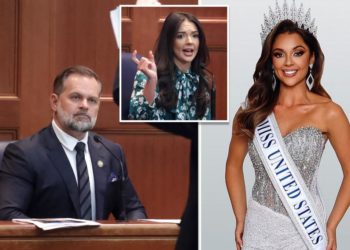Welcome back to Foreign Policy’s SitRep.
Here’s what’s on tap for the day: Trump fires much of the National Security Council, Israeli Prime Minister Benjamin Netanyahu may be ready to accept a U.S. cease-fire proposal, and U.S. Vice President J.D. Vance embraces bitcoin.
(Yet Another) Friday Night Massacre
Even with the level of personnel turnover we have come to expect from U.S. President Donald Trump across his two administrations, last week’s cuts to his National Security Council (NSC) were staggering in their scale and scope.
As NSC staffers prepared to head into the long Memorial Day holiday weekend on Friday afternoon, more than 100 of them reportedly received an email from the council’s chief of staff, Brian McCormack, saying they would not need to return and giving them 30 minutes to clear out their desks.
Key individuals ousted include those charged with overseeing the council’s work on the Middle East and Europe, as well as over a dozen staffers who worked on China.
This isn’t the first NSC shake-up of Trump’s administration, either. His chosen national security advisor, Mike Waltz, was abruptly reassigned to the United Nations earlier this month following the “Signalgate” fiasco—replaced by Secretary of State Marco Rubio in a double role—and around half a dozen NSC staffers were reportedly fired or reassigned back in early April.
Trump’s shrinking NSC presents a sharp contrast to the body’s outsized power under his predecessor, former President Joe Biden, whose national security advisor, Jake Sullivan, was one of the administration’s most prominent officials and drove many of its foreign-policy priorities.
Why the purge? The White House says that reducing the NSC’s size will help “facilitate more streamlined processes.”
The changes reflect Trump’s decision-making style, which is “apparently more informal,” Michael Allen, a former NSC official in the George W. Bush administration, told SitRep.
“[Trump] likes making decisions. Most of the time we hear of fewer NSC options and papers rising to the top, and more directives given from the top down,” Allen said. “Trump knows what he wants to do. He’s looking for the people at the National Security Council to implement what he wants.”
Trump also oversaw a significant reduction of the NSC back in 2020, toward the end of his first term in office, with then-National Security Advisor Robert O’Brien slashing the council’s staff to less than half of what it was under President Barack Obama. Trump ultimately went through four national security advisors during his first term.
“There’s actually a lot of continuity with these moves with the first Trump term,” Jonathan Guyer, program director of the Institute for Global Affairs (IGA), a New York-based think tank, told SitRep, citing Trump’s preference for conducting foreign policy through individual envoys such as his son-in-law, Jared Kushner, in his first term and his Middle East envoy, Steve Witkoff, in his current term. “He has this kind of kitchen cabinet of advisors,” Guyer added. (The IGA published a tracker for Trump’s NSC staff last week that Guyer said has almost immediately become a “historical artifact.”)
Potential problems. For decades, the NSC has been the nerve center for shaping U.S. foreign policy—serving as a conduit between the White House and federal agencies while advising the president on pivotal security and diplomacy issues.
The NSC has two primary functions, said Allen, which are to “staff the president, to have his personal national security advisors in the building” and to “coordinate the interagency on issues that the president cares about.”
The influence of the NSC—and the national security advisor, for that matter—has varied from president to president. Trump has every right to shape it as he sees fit.
But critics of Trump’s approach say he’s depriving himself of a crucial tool and dangerously disregarding expertise at a time when Washington is contending with a range of global crises and complicated issues: the war in Ukraine, the war in Gaza, and nuclear negotiations with Iran, to name a few.
Though the White House contends that a smaller NSC will mean fewer cooks in the kitchen, the Trump administration may come to find that it’s difficult to swiftly coordinate on pressing issues with far less staff on hand.
The size of the NSC staff “definitely needed to be lower” than it was under the Obama and Biden administrations, said Allen. If the staff is “too big, it usurps the departments and the agencies,” Allen said, but if it’s too small then there’s “arguably less coordination and less expertise at the top.” This is a “trade-off” that every administration has to figure out for itself, he said.
Let’s Get Personnel
The NSC isn’t the only agency facing a purge of senior staffers under Trump. Three of the top six division heads of the Cybersecurity and Infrastructure Security Agency (CISA) will depart the agency by the end of this month, according to an internal memo first reported by the Washington Post. Several heads of the agency’s regional offices will also leave, the memo said, along with its heads of finance, strategy, human resources, and contracting.
CISA has long been tasked with defending U.S. government systems, elections, and critical infrastructure from foreign hackers. It has also long been a target of Trump, who fired CISA director Chris Krebs in 2020 for contradicting Trump’s claim that there was widespread fraud in the 2020 election that Trump lost. (Trump has continued to target Krebs in his second term, revoking his security clearance and ordering the attorney general and other officials to review his actions during his time in that job.)
On the Button
What should be high on your radar, if it isn’t already.
Trump flirts with punishing Putin. Russia on Wednesday proposed holding another round of peace talks with Ukraine next week in Istanbul. The first round, which Russian President Vladimir Putin skipped, failed to secure a cease-fire as both Kyiv and Moscow remained far apart on key issues.
Moscow’s push for fresh peace negotiations comes as Trump has expressed growing impatience with Russia over its continued attacks against Ukraine. Russia in recent days launched some of its largest missile and drone attacks of the war. Trump, who has raised the prospect of slapping new sanctions or other economic penalties on Russia amid the lack of progress in his effort to secure a peace deal, on Tuesday warned Putin that he’s “playing with fire.”
But Trump on Wednesday told reporters at the White House that he’s holding off on taking any concrete steps yet because he believes a deal may be close and doesn’t want to “screw it up by doing that.”
Is a Gaza cease-fire on the horizon? Israeli Prime Minister Benjamin Netanyahu on Thursday told families of hostages still held by Hamas in Gaza that he has accepted a new cease-fire proposal put forward by Witkoff. This comes as Israel faces mounting criticism over the humanitarian crisis in Gaza and a controversial new aid distribution system—which is also backed by the U.S.—that’s been marred by violence and chaos this week.
Hamas is reviewing the proposal, which would reportedly involve releasing 10 living hostages and 18 dead hostages in separate phases in exchange for a 60-day cease-fire. There are 58 hostages remaining in Gaza, 20 of whom are believed to be alive.
Ruby Chen, the father of American Israeli Israel Defense Forces soldier and hostage Itay Chen, who is believed to have been killed on Oct. 7, 2023, was among those who met with Netanyahu on Thursday. After the meeting, Chen told SitRep that there’s optimism surrounding getting a partial deal across the finish line. But he added that such an agreement would be “dicey” and emphasized that the hostage families “have been advocating for a deal that shows a path to get to the last hostage.”
“If you’re able to get half, why not get all of them out?” Chen said.
More China chip curbs. The Trump administration has reportedly blocked several U.S. companies that make software used to design semiconductor chips from selling to China, further escalating a battle over access to critical technologies. It’s one of several recent U.S. broadsides against Beijing, including curbs on the sale of jet engine technology to China and an announcement by Rubio that the United States will begin revoking the visas of Chinese students.
Trump has largely continued Biden’s policy of export controls aimed at China’s semiconductor industry, in an attempt to slow down Chinese development of advanced technologies such as artificial intelligence.
Snapshot

Hot Mic
“You will never see this administration trying to handicap your community,” Vice President J.D. Vance said in a speech to cryptocurrency enthusiasts at the Bitcoin 2025 conference in Las Vegas on Wednesday, touting the Trump administration’s firing of former Securities and Exchange Commission chair and noted crypto-skeptic Gary Gensler (Gensler actually resigned before Trump took office).
“I’m here today to say loud and clear—with President Trump, crypto finally has a champion and an ally in the White House,” Vance said. Trump has indeed been a staunch backer of the crypto industry, establishing a bitcoin strategic reserve early in his term and signing a deal through his personal crypto firm World Liberty Financial with the United Arab Emirates before his visit earlier this month. Many in Washington have raised corruption concerns around Trump’s cryptocurrency holdings, particularly his personal $Trump meme coin, whose top backers Trump hosted for a private dinner at his golf club in northern Virginia last week.
Vance jokingly referenced those concerns on Wednesday, praising the “energy” of the crowd before saying: “I promise I’m not just saying that to juice my own meme coins.”
Put on Your Radar
Friday, May 30: The IISS Shangri-La Dialogue begins in Singapore.
Sunday, June 1: Mexico holds judicial elections following controversial reforms to the way judges are elected.
Poland conducts a presidential election runoff.
Tuesday, June 3: South Korea holds an early presidential election.
This Week’s Most Read
- Russia Has Started Losing the War in Ukraine by Michael Kimmage
- Turkish Guns Are Taking Over the U.S. Market by Naomi Cohen
- We Can No Longer Dismiss Trump’s Blatant Racism by Howard W. French
Quote of the Week
“I don’t know that there’s more to know, but you’re going to know everything we know.”
—FBI Director Kash Patel during a Fox News interview regarding the investigation into the July 2024 assassination attempt on Trump. Patel, who has a history of pushing conspiracy theories, threw cold water on conspiracy theories about the shooting, which took place at a Trump rally in Butler, Pennsylvania. “That’s a great example of people looking for things where things don’t exist,” he said.
The post Is the NSC Dead? appeared first on Foreign Policy.




